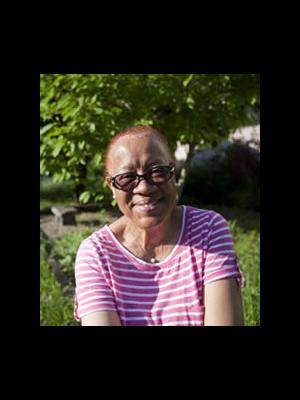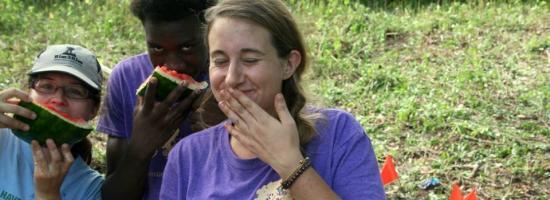Gwen Heath

When Gwendolyn Heath moved into 168 Wolcott almost ten years ago, she had reason to be apprehensive. In the 1990s, the Latin Kings gang governed the neighborhood; and though a mid-decade crackdown had scattered the group, crime remained a major community issue. As a black woman, Gwen was a minority in a mostly Hispanic area. The dominant language on the streets was one she did not speak.
Yet it is to those streets, and especially to the Wolcott and Lloyd Greenspace founded in 1996, that Gwen now devotes a tremendous amount of energy. While she still works a full time job, evenings and weekends find her outdoors beautifying, and this way protecting, her neighborhood.
Gwen first got involved with Greenspace after a neighbor, Migdalia Castro, recruited her to volunteer at the voting polls. Migdalia was working on a number of initiatives – voter registration, toys for tots, blockwatch activities – and encouraged Gwen to get involved. Gwen was interested, but hesitant to take a leadership role.
It was a lifelong love of flowers, inherited from her grandmother, that enabled Gwen to step up as a leader. She organized plantings in the Greenspace. She let children arrange the flowers anbd tried to take a hands-off stance, especially with the kids. “I let them set it up and say, ‘see what you think.’ I’ve gotta give other people the credit – it’s not just all me,” says Gwen. “It’s not my garden, but people think that.” Her modesty betrays a strong and continuous commitment to the Greenspace, a commitment that the neighborhood clearly recognizes.
Gwen is out there first thing in the morning, always during spring-cleaning, often throughout the rest of the season. Many nights she weeds and waters after work.
The men of the neighborhood on their porches, she has noticed, keep an eye her, the solitary woman working in the dark.
In the Wolcott and Lloyd neighborhood, safety is a serious concern. Gwen’s efforts to create a beautiful Greenspace are directly tied to her personal quest to improve the area’s security: Gwen is single woman living alone; she is a minority in the neighborhood; and she sees herself, as well as every other member of the community, as an individual with a set of rights and responsibilities. These rights are founded upon a single, simple obligation: respect.
The key to recognizing and working with respect is to let go of fear and judgment, she says. For example, as long as they clean up, Gwen allows a local crew to drink their beer in the park – sometimes they even help her out with work. She always thanks those who contribute. She says she no longer fears for her safety in the streets. She encourages her neighbors to think the same way and take control of their wellbeing.
“I spend a lot of time encouraging people not to be scared. I say, call if need public works, security. I took that upon myself, to do that… No one else is going to call, I’ve got to protect myself.” Gwen takes responsibility for the neighborhood as a whole as much as she does for herself. She calls herself the neighborhood’s unofficial, one-woman blockwatch.
Gwen feels a similarly diligent responsibility – a respect – for the maintenance of the Greenspace. While many residents and URI interns have contributed, she is the main, continuous advocate in its upkeep. “A couple of times I was going to give it up,” she says, “but if I give it up, it’s going down.” She cites more widespread participation as her top wish for the project.
The Greenspace may be a lot of work, but it also provides Gwen with small daily pleasures. “I can have a bad day, and I just come, sit down, and it takes away all the bad stuff,” she says. She brings sick friends to sit in the garden so they, too, can experience its healing qualities, enjoying the space she works so hard to cultivate. “I see the birds… two beautiful blue jays… and it makes you feel good. It’s therapy.”
